Coronavirus: Shops reopen in Wales with social distancing
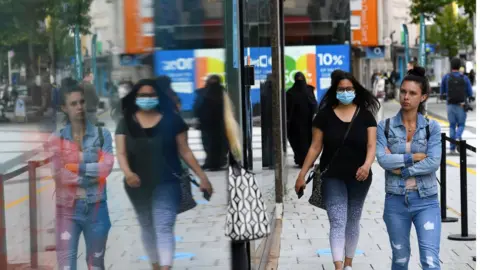 Wales News Service
Wales News ServiceAfter months of being closed many shops are opening for the first time and welcoming customers back.
From Monday, non-essential stores are able to open for the first time since coronavirus restrictions were brought in.
But with strict social-distancing and hygiene measures in place, shopping will look very different compared to before coronavirus hit.
The Welsh Retail Consortium said many shops were "in a fight for survival".
Sara Jones, of the WRC, said lockdown had cost non-food stores £1.7bn a week during April and May, and with sales "expected to remain weak", many would not reopen their doors.
She told BBC Radio Wales safety was "the priority" and that businesses had been working hard to achieve this.
"We just implore that people are considerate to fellow shoppers and people working in store.
"Its going to be quite a mixed picture but the most important thing for us is that we have the opportunity to open now.
Non-essential shops had been under "a huge amount of pressure" and their survival was on "a wafer thin-edge", she said.
"And we'll be doing all we can to encourage consumers back into shops safely and hope that confidence can grow in consumers to come back into store."
An initial surge of shoppers would be no guarantee they would stay, Ms Jones said.
In some European nations business was brisk initially before dropping back.
"I would expect that to happen for some time here until consumer confidence returns back to almost normal levels," she said.
Large queues where seen in parts of England after non-essential stores, including clothing shops like Primark, opened on 15 June.
Health Minister Vaughan Gething has said he does not want to see a repeat of "crowds bunched together outside" when shops reopen in Wales.
In Wales, people will only be able to visit non-essential stores if they are near their home - within five miles as a general rule - due to coronavirus regulations.
Some retail giants and smaller shops have already confirmed they will not open branches despite being given the green light by the Welsh Government.
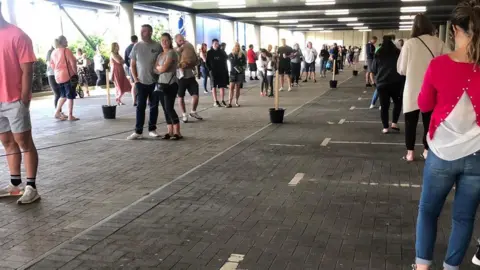 @stevewo
@stevewoPrimark, which does not sell online, has started trading again in England and Northern Ireland, but stores in Scotland and Wales will remain shut for now.
The company, which has stores in Cardiff, Newport, Cwmbran, Llanelli, Swansea, Llandudno, Wrexham, said it was still working through plans for reopening and it would only open when it was "convinced that it is safe and right to do so".
Debenhams has already said its Merthyr Tydfil branch will not reopen as measures are eased, but its Swansea and Newport stores will after the councils allowed the chain to defer paying business rates.
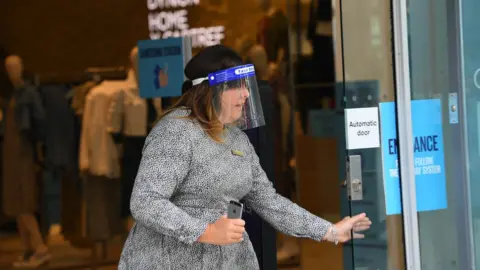 Wales News Service
Wales News Service
What will shops be like in a pandemic?

If you go to your favourite shop from Monday, do not expect business as usual.
The WRC said retailers had "invested significantly in social distancing measures", in an attempt to make it safe for customers and staff to shop.
And with some councils, including Cardiff, already racing to redesign busy high streets, to provide more space for shoppers and outdoor areas, our high streets may never look the same again.
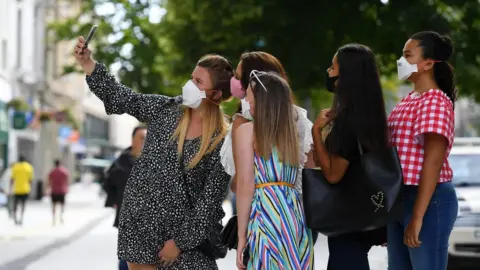 Wales News Service
Wales News ServiceMeasures you could see from Monday include:
- Screens at pay points and floor markings to show social distancing
- Extra staff or security on doors to check the number of shoppers going in
- Socially distanced queuing to get into the store and to pay
- Staff wearing masks and extra cleaning being carried out
- Hand sanitiser at entrances and cleaning for baskets and trolleys
- Some changing rooms closed, while public toilets remain shut
'A different Marks & Spencer'
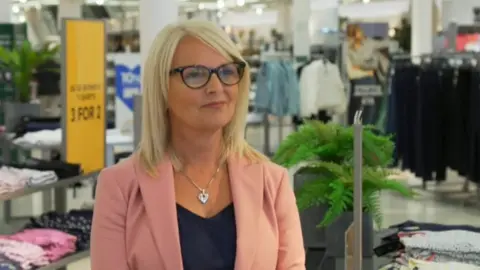
At Marks and Spencer staff have been working to get stores ready for reopening.
While food halls have been open, with social distancing measures in place, clothing and home stores will reopen from Monday.
Allison Jenkins, head of Wales and west region for Marks & Spencer, said this had helped them to prepare for reopening the rest of their business.
When customers enter stores on Monday they will be given a brief description of where things are, and asked to respect the two metre rule by looking at floor markings.
"Customers will see very different clothing and home departments. There will be a lot less equipment on the shop floor to create an air of confidence," she said.
"We can't tell customers not to touch anything but we do ask them to minimise that as much as possible."
'How busy are we going to be?'
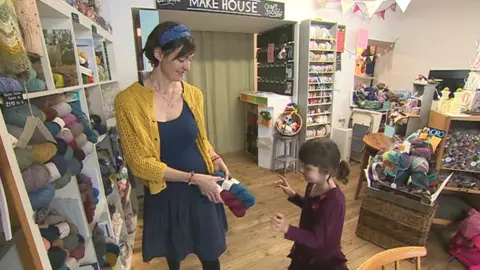
Ginevra Croft runs a wool shop in Abergavenny, Monmouthshire and is ready to "crack on with how it's going to be next".
But with shoppers still being told to stay local for another two weeks, she has concerns about how many customers will really come through her doors.
"What's that going to really do to our passing trade?" she said.
"How busy are we we going to be when we open? How are we going to make it worthwhile for the business to be here with open doors?" she said.
It is going to be tough
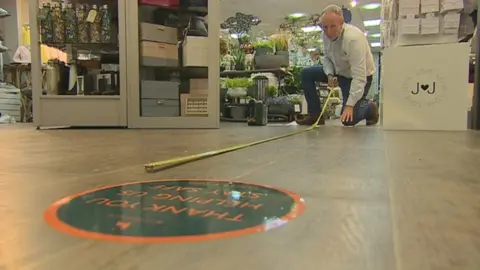
In his shop, Richard Barber is preparing for the reopening, measuring out two metre floor markings.
But Mr Barber, who runs Nicholls clothing and gifts shop in Abergavenny, said he knew it would be "hard in the coming months".
"We are retailers and this is what we do. We've got a really good team behind us," he said.
"We're hopeful, but I suppose at the end of the day, realistically, it is going to be tough in the coming months."
Non-essential shops have been closed to the public in Wales since lockdown began in late March.
Ms Jones, from the WRC, said with fewer customers able to enter stores and fewer expected to head to the high streets due to travel restrictions and safety concerns, many retailers were facing a difficult future.
"Retailers rely on getting customers through their doors in order to pay rent and employees' wages," she said.
"With consumer demand expected to remain low for some time, it is vital that businesses of all sizes can access government support to enable them to make adaptions to their stores where necessary," she said.


On Monday other changes to lockdown also mean people will be able to travel further than the five-mile general rule, but only on compassionate grounds, to see those who they are worried about.
Outdoor sports courts and tracks will open, but only for non-contact sports, people can go to places of workshop for private prayer and non-professional elite athletes can resume training.
People will also be able to get married if they adhere to lockdown regulations, stay local and socially distance.

Some 190,000 people are employed in retailing and wholesaling in Wales.
While many have worked through the pandemic and the return of others will be staggered, it's clear a significant part of the Welsh economy is opening for business today.
There was some unhappiness among retailers in Wales about the uncertainty of having no specific reopening date, which there had been in England.
But non-essential retailers were given three weeks to prepare ahead of a decision by the Welsh Government and have been allowed to open days after the end of that period.
That might give some confidence to other sectors like tourism which has now been given three weeks' notice to prepare for reopening if the right safety measures are in place.
But different sectors don't operate in isolation.
Shops in tourist areas may now open but they will be affected by the fact the tourism industry is still in lockdown and people are being encouraged not to drive more than five miles.

